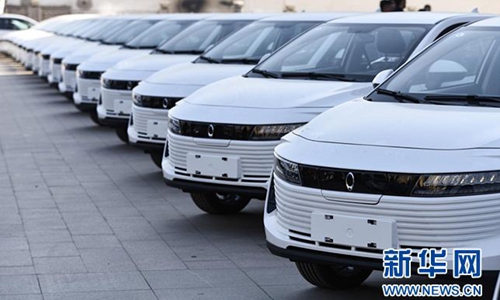HOME >> SOURCE
China's auto market to bottom out this year and next
Source:Xinhua Published: 2020/1/22 11:55:16

Photo:Xinhua
China's auto market will likely bottom out this year and next, after posting sales declines for two consecutive years, a senior official said Monday.
Both car sales and production are likely to reach around 25 million units this year, flat or slightly down from last year, Miao Wei, minister of industry and information technology, said at a press conference.
China's auto sector is faced with chronic problems such as a lack of research input and key technologies, as well as some short-term impacts from cuts in new energy vehicle subsidies and stricter emission standards for traditional petrol-powered cars, Miao said.
However, the market confidence has picked up as auto production posted year-on-year growth in November after pro-consumption policies took effect, he added.
China will continue to push for high-quality development in the auto sector, stimulate market vitality, encourage auto producers to explore overseas markets and give a level playing field to all Chinese and foreign-invested companies.
When talking about US carmaker Tesla's plant in Shanghai, Miao said it is the country's first wholly foreign-invested new energy car factory.
The construction of the gigafactory began on Jan. 7, 2019. In 10 months, it entered trial production. On Dec. 30, the first batch of 15 China-made Model 3 cars were delivered.
"This shows China's unswerving resolve to build an international business environment and push for a new round of opening up," he said.
Acknowledging that lower prices of Tesla cars will bring pressure to domestic new energy vehicle producers, Miao said it will benefit Chinese consumers and act as an incentive to push carmakers to strengthen innovation and improve their competitiveness.
About 25.77 million automobiles were sold in 2019 in the world's biggest auto market, down 8.2 percent, according to the China Association of Automobile Manufacturers.
The drop widened from the 2.8-percent fall in 2018 as trade tensions, tighter emission standards and retreating subsidies for new-energy vehicles combined to weigh on the industry.
Posted in: ECONOMY